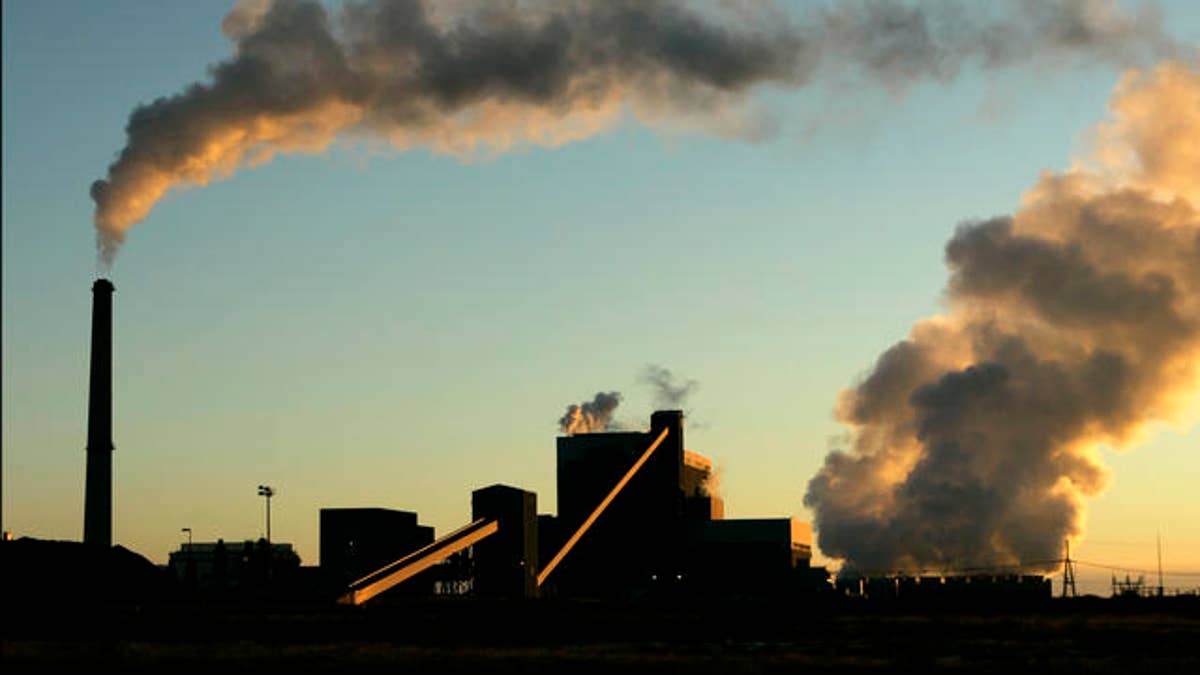
FILE: Sunflower Electric Cooperative operates this coal-fired power plant in Holcomb, Kan.
The U.S. has reduced its carbon footprint by 7 percent over the last four years, according to a new report that says the trend was driven by the recession but predicts it will continue on the strength of technological changes and a national campaign opposing the use of coal.
But a coal industry advocate says the trend will end once the economy roars back to life and argues that the Beyond Coal Campaign has been effective only in costing the U.S. 1.2 million jobs.
The report, released Wednesday by the Earth Policy Institute, an environmental group, is an analysis of data from the Energy Department that shows that the U.S. output of heat-trapping carbon dioxide steadily rose since 1950 until 2007 when it reached its peak.
Then from 2007 through the first eight months of 2011, carbon emissions from coal dropped 10 percent and oil emissions fell 11 percent. At the same time, more Americans used natural gas, leading to a 6 percent rise in emissions.
“It’s sort of a surprising development because our carbon emissions have been going up for decades and decades,” Lester Brown, president of the organization, told FoxNews.com. “It wasn’t expected it could turn so quickly and decisively.”
But while the report focuses on the decline of carbon emissions in the U.S., pollution worldwide is increasing at record levels.
According to new figures from the Energy Department for 2010, carbon emissions across the globe jumped by 564 million more tons than the previous year -- the biggest amount on record.
Even so, emissions in the U.S. will continue to decline, by as much as 30 percent by 2020, according to Brown’s analysis.
The report linked the initial drop to the recession but said powerful new forces are reducing the use of both: a national campaign opposing coal and changing behaviors as a result of advanced technology that have cut down on the use of oil.
The report noted that the Beyond Coal campaign has led to a near de facto moratorium on new coal plants and to the closing of 68 of the nation’s 492 coal-fired power plants.
“With current and forthcoming U.S. Environmental Protection Agency air quality regulations on emissions of mercury, sulfur, and ozone precursors requiring costly retrofits, many more of the older, dirtier plants will be closed,” the report said.
But Brown gave most of the credit to the campaign, saying regulations haven’t been much of a factor in the decline of emissions.
Among the changes responsible for the decline in carbon emissions, according to the report, are incandescent light bulbs being replaced by compact fluorescents and LEDs; more efficient refrigerators, water heaters, TV sets and other household appliances coming to market; and the growing use of wind, solar and geothermally generated electricity.
Jason Hayes, a spokesman for the American Coal Council, agrees with the report’s finding on the decline in carbon emissions but doesn’t believe it signals a long-term trend.
“If the economy is growing, we’re going to increase our use of fossil fuels,” he said. “There isn’t going to be enough Chevy Volts sold to change our fossil-fueled economy to an electric renewable economy. That’s not going to happen in the next 10 or 20 years.”
Hayes also said the Beyond Coal campaign has been a drain on the U.S. economy, costing the nation 1.2 million jobs by closing coal plants or preventing new ones from opening.
“Having done that at a time when the unemployment rate is 9.1 percent, if you’re going to toot your horn, you have to live with full spectrum of what your actions has brought,’ he said.




